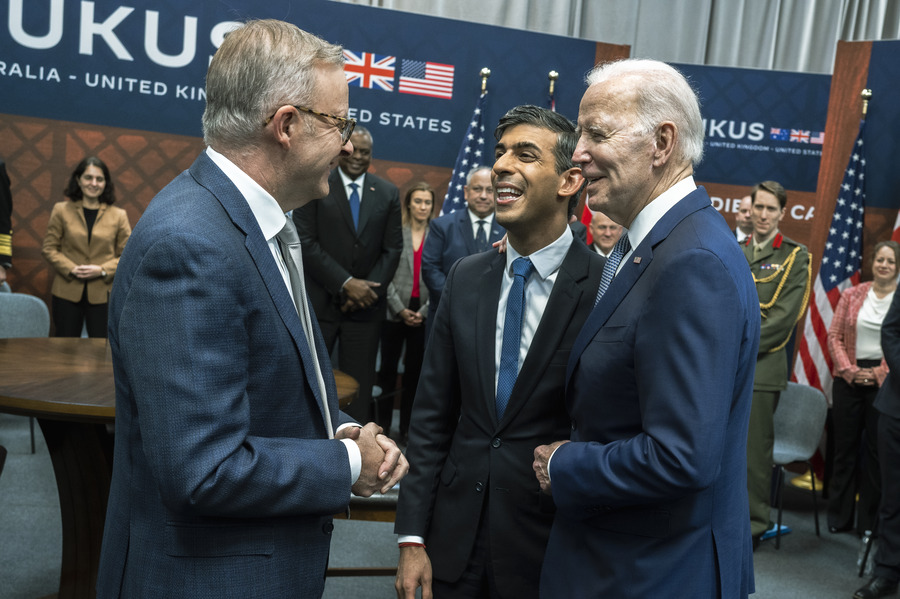2001 and 2002 AUMFs as Basis for Iraq Strikes?
Published by The Lawfare Institute
in Cooperation With

Various reports of the President’s meeting with congressional leaders (e.g here and here – note especially Pelosi’s comments) suggest that the administration believes that the 2001 AUMF (post-9/11) and the 2002 AUMF (that was the basis for the 2003 invasion of Iraq) together provide all the authorization it needs for any new uses of force in Iraq. I explained a few days ago why I believe the 2002 AUMF works (Wells challenged me here). I had discounted the relevance of the 2001 AUMF (here is Bobby’s take) because I assumed there were no remaining ties between ISIS (or any members of the ISIS leadership) and al Qaeda. That assumption might well be wrong. Or the administration might be reading the 2001 AUMF to authorize force not just against associates of al Qaeda, but also (as the WP once reported it was considering) against associates of associates of al Qaeda, which (through various connections) ISIS or members of ISIS might be. In any event, these exchanges from the Senate Foreign Relations Committee hearing last month (between Senator Corker and DOD General Counsel Stephen Preston) might lend credence to the view that the administration believes the 2001 covers (in some contexts) ISIS or some members of ISIS:
CORKER: So the group that I discussed in my opening comments, ISIS, which is split from Al Qaida, that is not affiliated with Al Qaida -- and actually I heard administration officials had expressed concerns about their ability to deal them in Syria and as they migrate back across into -- to Iraq, are you saying that even they're not a part of Al Qaida, you have the authority to go against them? PRESTON: Senator, what we would do if we were presented with a need and an opportunity, contemplating the use of military force, would be to examine what our authorities were. And that would consist, first of all, of determining whether or not they would fall within the AUMF, as an associated force, using the definition that we have provided. Or if not, if they present a threat of imminent attack on this country, we could rely on the president's inherent constitutional authority. . . . CORKER: And I would like to ask Mr. Preston which of these groups -- I'm going to name some groups -- you're authorized to go after under the 9/11 AUMF? . . . ISIS? PRESTON: Sir, with respect to groups in addition to the ones that I am . . . CORKER: Yes or no? I want a yes or no answer. Are you authorized under the 9/11 AUMF to go after ISIS? PRESTON: Sir, I can't speak publicly about which groups -- particular groups we may or may not have determined... CORKER: Is this a classified answer? Is that the reason? PRESTON: That's my understanding, yes, sir. CORKER: So, I do wonder how -- again, this gets back to a topic many of us discussed last night. I don't know how we can debate these issues when you cannot even tell us whether we can or cannot go after groups based on authorizations that Congress itself passed. I just want to highlight that. … CORKER: Well, there are very concrete situations happening. So, right now, you have made a determination, I guess, with ISIS; very concrete things are happening there and AQIM. So, I assume in a classified setting, you could share with us whether, in fact, you have the authority to go after these groups. Is that correct? PRESTON: In a classified setting, we could discuss the available classified intelligence and how the standards... CORKER: I just want to know if we can or cannot. Can you tell me those things in a classified setting? PRESTON: That would have to take place in a classified setting.
Jack Goldsmith is the Learned Hand Professor at Harvard Law School, co-founder of Lawfare, and a Non-Resident Senior Fellow at the American Enterprise Institute. Before coming to Harvard, Professor Goldsmith served as Assistant Attorney General, Office of Legal Counsel from 2003-2004, and Special Counsel to the Department of Defense from 2002-2003.





